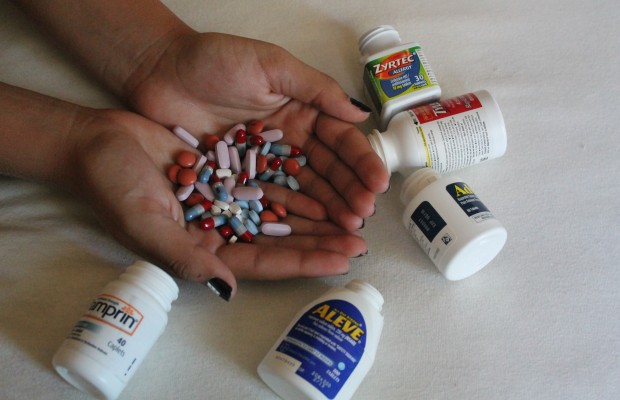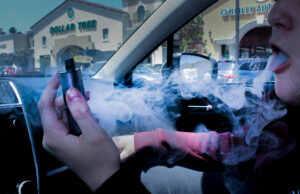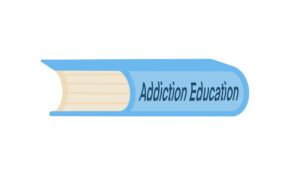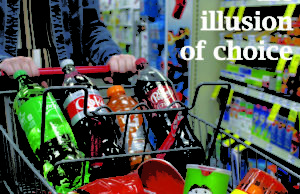Prescription Drugs

Been There, Done That, Never Going Back
When Rachel Andrews*, junior, abused prescription drugs, she would often fall asleep in the middle of lectures and wouldn’t even hear the bell ring at the end of class. Hardly anyone noticed.
“I got to the point where I was taking three (pills) a day during school, in the mornings and after school to get my homework done,” Andrews said. “And then if I went any more than four hours without it, I would get a miserable headache, become nauseous and probably throw up.”
Because her mom needed the medications, Andrews had easy access to Xanax, Oxycontin, and Vicodin – drugs that are extremely addictive when used without medical reason. Although she quit a few months ago, after her parents found out and the “negatives started outweighing the positives”, she believes that her past dependence on them is still a large portion of herself.
“Addiction is when it’s what your life revolves around,” Andrews said. “It’s never something that’s not on my mind. It’s kind of always there.”
She began using the drugs at the beginning of last school year when, after she saw an improvement in her academic performance and motivation to do well, with the pills also helping her stay “happier”.
“They’re better,” Andrews said, when explaining how these over the counter drugs compare to more mainstream drugs, such as marijuana. “They feel better. There’s less negative association with them. They’re more readily available. You don’t have to go through dealers, upon dealers, upon dealers, when it just gets more and more expensive. And you don’t have to do stupid (stuff) to get them.”
When it comes to the doctors that prescribe or recommend over-the-counter drugs, Andrews thinks that, although freely prescribing drugs isn’t ideal, cutting back on them could create more problems than it prevents.
“There are doctors that when you go to them you can tell that they’re not doing their job right, but they’re still giving you the medications you need, like the anti-depressants I need,” Andrews said. “Even though he’s just sitting there like, ‘Everything’s the same? Cool? ‘Kay’ and then I hear my prescription printing before I finish speaking. Like I know there’s a problem there, but if it’s super regulated then it would be tough to get what you actually need.”
Even though Andrews thinks that if she decided to go back to her old ways “her life would be easier and she would do better in school again,” she does regret starting in the first place.
“After starting and seeing how good everything could be, it made everything else a lower low than it was before,” Andrews said.
Her days of sleeping through the bell may be over, but when asked to give others advice who are experimenting with prescription drugs, Andrews answered, “I’m not qualified because I still want to do drugs everyday.”
*name changed upon request
Lack of Regulation
When people hear the words “drug abuse”, the first images that come to mind are of people smoking marijuana, or injecting an illicit substance into their arms. However, there are other types of drugs to be abused, one of the most prominent of these are doctor-prescribed drugs.
According to the National Institute on Drug Abuse, “…if you take a medicine in a way that is different from what the doctor prescribed, it is called prescription drug abuse.” This means that taking a medicine prescribed for someone else, taking a larger dose than prescribed, taking the medicine in a different way than intended by the doctor (such as crushing tablets and then snorting or injecting them), or using the medicine for another purpose such as getting high are all considered various forms of drug abuse.
While misuse of prescription drugs may seem innocent considering medications have legitimate uses, even the abuse of simple sleep medications can lead to complications. This includes lowered blood pressure, withdrawal systems, and even addiction.
Preeyada Chen, a pharmacist at Vons pharmacy, has sold drugs prescribed by a doctor, such as birth control and painkillers like Vicodin and Advil, to high school students.
Chen believes that buying with cash has become a problem in the realm of drug purchases.
“If people want to get prescription drugs, then they go to multiple doctors and pretend they have pain … if people have insurance and they bill (the prescription) from pharmacy A and go to pharmacy B to fill it, (the pharmacy) can reject it. But if they pay cash, it can be dangerous because we can’t track it.”
Problems like these are causing increasing accessibility to medications. According to the 2012 “Monitoring the Future” survey, about 50 percent of high school seniors said that opioid drugs other than Heroin (such as Vicodin) would be fairly easy to get.
“There are ‘quacks’ who write it out from their pickup trucks. They don’t have an office, but they have a prescription pad, and they just write it (for the customer),” Chen said. This lack of regulation coupled with ease of access makes what seems like a bottle of prescription drugs into a much more dangerous situation.



